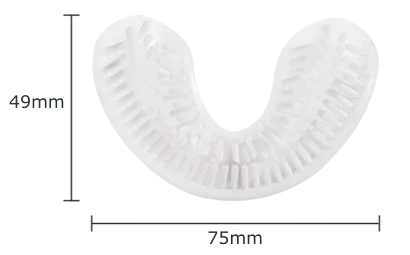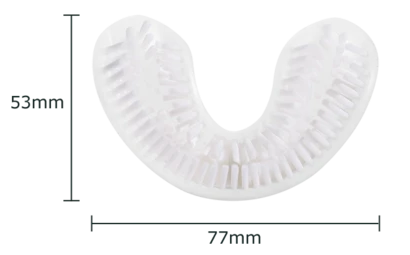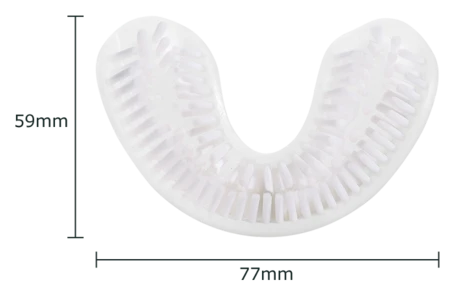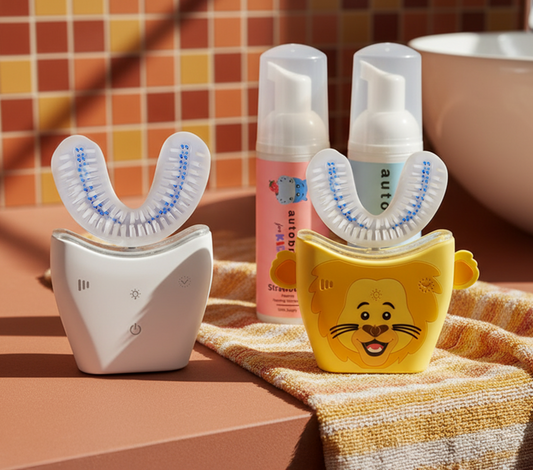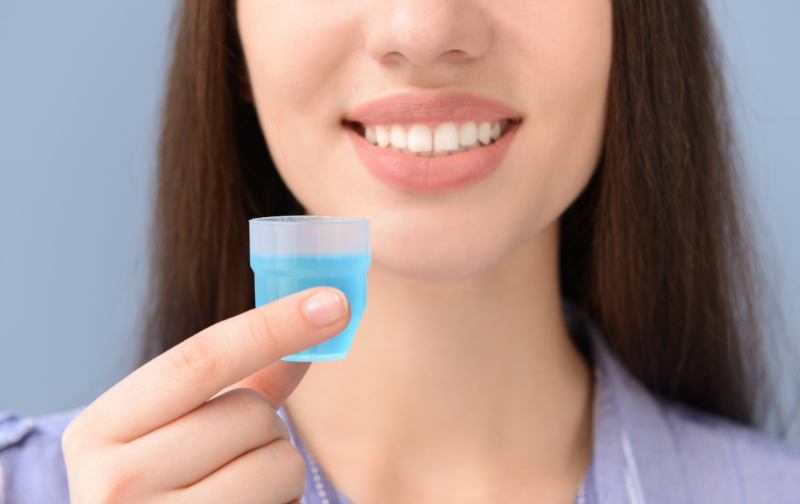
Mouthwash: What You Need to Know
Mouthwash is a popular hygiene product that is used to clean teeth and gums, freshen breath, and protect against tooth decay and gum disease. But what is mouthwash? What are the different types of mouthwash available? What are the benefits of using mouthwash? And most importantly, is mouthwash necessary for good oral health?
In this blog post, we'll answer all of your questions about mouthwash so that you can make the best decision for your oral health.
Is Mouthwash Necessary?
Most of us were taught from a young age that it's important to brush our teeth and to use mouthwash. But is mouthwash really necessary? According to dental experts, the answer is yes — and no.
"It all depends on each individual's oral health concerns," clarifies Barbara Rich, DDS, FAGD, AGD representative. "If someone has a lot of inflammation which is causing bleeding gums, then the side effect of staining caused by some prescription mouthwashes may be worth it to improve their health. Staining can be polished off at the regular semiannual visit to the dentist."
Dr. Rich further clarifies, in any case, that if the fresh taste is your only benefit from utilizing mouthwashes, it can be avoided, and should be if you have dry mouth or get ulcers from alcohol; the main ingredient in most mouthwashes.
How do you know whether mouthwash is right for you? Talk to your dentist. They can help you weigh the pros and cons and decide if using mouthwash is the best choice for your oral health.
What Are the Benefits of Mouthwash?
Mouthwash is a great way to keep your mouth clean and your breath smelling fresh. But did you know that mouthwash can also help to prevent cavities and gum disease? That's because most mouthwashes contain fluoride, which helps to strengthen tooth enamel and prevent decay.
Some mouthwashes also contain ingredients that can kill bacteria and viruses, making them an effective way to reduce the risk of infection. Oh – and if you have sensitive gums – there are now special mouthwashes that can help to soothe irritation and reduce inflammation.
🦷️ Toothy Tip: Fluoride can be toxic and should be avoided with young children. Luckily, AutoBrush’s all-natural, fluoride-free toothpaste can double as a mouthwash and helps little ones flush bacteria from their mouth and cheeks. Click here to shop.
Are All Mouthwashes the Same?

You're standing in the mouthwash aisle at the store, trying to decide which one to buy. There are so many options! And they all claim to do the same thing: freshen your breath and clean your mouth. So, are all mouthwashes the same?
The answer is not exactly.
Most mouthwashes contain ingredients that can kill bacteria and help freshen your breath, but some mouthwashes also have additional features like whitening or tartar control.
Of course, even if you find the perfect mouthwash for your specific goals, it won't do much good if you don't use it correctly. Be sure to follow the instructions on the bottle, and swish the mouthwash around in your mouth for at least 30 seconds before you spit it out. With a little bit of care, you can find the perfect mouthwash to help keep your mouth healthy and your breath smelling great!
Can Mouthwash Replace Brushing?
Mouthwash can help to remove debris and bacteria from your teeth, but it's not as effective as brushing. The act of physically scrubbing your teeth with a brush is what does the most to remove plaque and build-up. That said, if you can't brush your teeth, swishing with mouthwash is better than nothing. Just be sure to choose a brand with A+ ingredients, so you can help to prevent cavities even when you're not brushing.
Should I Use Mouthwash Before or After Brushing?
The best course of action may vary depending on the type of mouthwash you use and your oral health goals. For example, if you're using an antibacterial mouthwash, it's best to use it after brushing to ensure that the active ingredients have time to work.
On the other hand, if you're using a mouthwash that contains fluoride, you may get the best results by using it before brushing. Fluoride can help to remineralize tooth enamel and prevent cavities, but it only works if it's in contact with your teeth for at least two minutes. So, if you brush first, you may inadvertently rinse away the fluoride before it has a chance to do its job.
Ultimately, the best way to use mouthwash is as directed by the manufacturer. And, if you're unsure what method is best for you, don't hesitate to ask your dentist for advice.

Does Mouthwash Cure Bad Breath?
Several mouthwashes don’t actually eliminate the bacteria that cause bad breath, but help to freshen your breath by masking bad odors. If chronic bad breath is a concern of yours, there are mouthwashes options that are effective in treating bad breath over time. These mouthwashes contain ingredients that kill bacteria or help to break down plaque. As a result, they can help to improve your oral health and reduce bad breath. For the freshest breath, it's best to focus on brushing and flossing regularly.
🦷️Toothy Tip: If you suddenly notice a very strong odor, it could be a sign of a bigger problem. You should check with your dentist immediately.
Why Does Mouthwash Burn?
Have you ever wondered why mouthwash burns? It's not hot and it's not acidic. So what gives? The answer has to do with the ingredients in most mouthwashes. Most mouthwashes contain alcohol, which is a very potent antiseptic. When you swish it around in your mouth, the alcohol kills off bacteria and other germs. That's why it's so effective at freshening your breath. However, the alcohol can also irritate your mucous membranes and cause a burning sensation. In addition, some mouthwashes contain menthol or other minty flavors, which can also cause a burning sensation.
🦷️ Toothy Tip: If you or a family member are sensitive, we suggest using a mouthwash like AutoBrush's foaming toothpaste and mouthwash that includes less harsh ingredients.
Does Mouthwash Kill Good Bacteria?
Does mouthwash kill good bacteria? This is a question that many people ask, and for good reason. After all, we’re constantly being told that we need to do everything we can to boost our immune systems and protect ourselves from harmful bacteria. So it stands to reason that we wouldn’t want to use a product that could potentially kill off the good bacteria in our mouths.
The answer isn’t quite so simple. While it’s true that most mouthwashes contain ingredients that can kill off both good and bad bacteria, they also typically contain ingredients that help to promote the growth of healthy bacteria.

Is It Bad to Swallow Mouthwash?
Swallowing a little mouthwash while brushing your teeth is probably not going to hurt you. After all, it is designed to be used in your mouth. However, swallowing a lot of mouthwash can be dangerous. Most mouthwashes contain alcohol and fluoride which can be toxic if consumed in large quantities. It is best to avoid swallowing mouthwash and to keep it out of reach of children who might accidentally ingest too much.
🦷️ Toothy Tip: Click here to shop for non-toxic mouthwash.
What’s the Best Mouthwash for Braces?
Most orthodontists will tell you that the best mouthwash for braces is a fluoride rinse. Fluoride helps to prevent tooth decay, and it's especially important for people who wear braces since they're more likely to suffer from tooth decay. However, not all mouthwashes contain fluoride, so it's important to read the label carefully before you buy. You should also avoid mouthwashes that contain alcohol as this can dry out your teeth and make them more susceptible to decay.
🦷️ Toothy Tip: If you're not sure which mouthwash is right for you, ask your orthodontist for a recommendation.
How Often Should You Use Mouthwash?
There's no hard and fast rule for how often you should use mouthwash, but most experts recommend using it twice a day. Some people like to use it after every meal, while others prefer to use it in the morning and evening.
If you're using mouthwash more than twice a day, be sure to check with your dentist to make sure you're not overdoing it. Mouthwash can be a great way to keep your mouth clean and your breath smelling fresh, but it's important to use it in moderation. Too much mouthwash can actually strip away the healthy bacteria that help to keep your mouth clean.
Why Does Mouthwash Make My Mouth Dry?
It turns out that the reason mouthwash can make your mouth dry is because of the alcohol content. Alcohol is a drying agent, so it can help to remove excess saliva and bacteria from your mouth. It can also strip away the natural oils in your mouth and slow down your saliva production, leaving your lips and tongue feeling dry and irritated.
Fortunately, there are many alcohol-free types of mouthwash on the market that can help you to avoid these problems. These products often contain ingredients like glycerin or xylitol, which can help to keep your mouth moist and healthy. So if you're looking for a refreshing way to keep your mouth clean without making it feel dry, be sure to check out an alcohol-free option next time you're at the store.
🦷️ Toothy Tip: Click here to shop for alcohol-free mouthwash options.
Does Mouthwash Expire?

Like most products, mouthwash has a shelf life. Most mouthwashes will last for two years after they are opened, but there are factors that cause them to expire sooner.
- ⭐️ Not stored correctly. If you don't store your mouthwash properly, it can become contaminated with bacteria.
- ⭐️ Product contains alcohol. If you use a mouthwash that contains alcohol, it can evaporate over time, making it less effective. So if you're not sure how long your mouthwash has been sitting around, it's best to err on the side of caution and get a new bottle.
Conclusion
Mouthwash is a popular way to clean teeth and gums, freshen breath, and fight cavities. Now that you know more about mouthwash, you can decide whether or not it’s a good fit for your oral care routine. Remember that no matter what type of mouthwash you use, it’s important to brush your teeth twice a day and floss daily to remove plaque and bacteria from your mouth.








